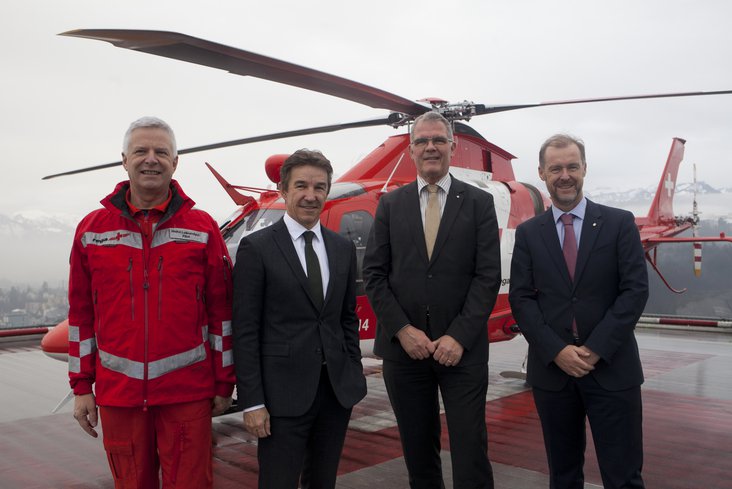Rega has been working together with the Swiss Air Force, Skyguide air navigation service and Federal Office of Civil Aviation (FOCA) for a number of years in order to set up and operate the so-called Low Flight Network (LFN). This countrywide network of instrument flight routes is based on satellite navigation and links airports, airfields, hospitals and Rega helicopter bases with each other. The helicopter flies by autopilot along a route stored in the on-board computer, rather like on a motorway - a considerable benefit in terms of safety and also a prerequisite for helicopters also being able to fly according to instrument flight rules (IFR) when visibility is poor.IFR approach flights now also possible for Rega outside normal operating times
Rega has already been able to successfully use various sections of the Low Flight Network routes, such as IFR approaches to the military airfields in Emmen and Meiringen, as well as to the helipad at the Inselspital University Hospital in Berne - but only in the daytime during the official operating times of the facility in question. For example, a Rega helicopter pilot was allowed to perform an IFR approach flight to Emmen military airfield at 9 o'clock in the morning in order to penetrate the blanket of high-lying fog and then fly the patient underneath the fog level to the nearby Cantonal Hospital in Lucerne. After 5 o'clock in the evening or at the weekend - that is, outside the airfield's operating hours - this same approach flight was not permitted. However, as rescue missions are not restricted to specific times of the day, it is essential for Rega to be permitted to use individual LFN routes and IFR approach flights outside these operating hours, too.
A milestone for the Low Flight Network project
The granting of this special authorisation by FOCA as from 23 December 2017 means that an important hurdle has been cleared on the path towards further expanding the Low Flight Network. "I am absolutely delighted that together with FOCA we have now been able to take a huge step forward," says Rega CEO Ernst Kohler. "Thanks to these new possibilities, Rega crews will be able to help more people and at the same time benefit from an increased level of safety during rescue missions." Christian Hegner, Director of the Federal Office of Civil Aviation: "Rega has carried out important pioneering work in integrating the LFN into the Swiss aviation system and thus also making it accessible to other users at a later stage." Further expansion measures are planned to allow the entire LFN to be used at night, as well as to link other hospitals and regions, such as the Engadin, with the network of instrument flight routes. In addition, Rega would like to have unrestricted use of the military approach flight procedures outside normal operating hours. "In close collaboration with the Swiss Air Force, we are undertaking groundbreaking work with this project, which is attracting attention worldwide," says Heinz Leibundgut, Chief Helicopter Pilot at Rega and a major driving force behind Rega's vision. "I am confident that our efforts will pay off for our patients."
Improved medical assistance in Central Switzerland, the Bernese Oberland and Ticino
Besides the Inselspital in Berne, Lucerne Cantonal Hospital will shortly become the second hospital in Switzerland to have an IFR approach route. Together with the special authorisation to use the approach flight paths of the military airfields in Emmen and Meiringen outside normal operating hours, as well as the implementation of IFR approach flights to the hospitals in Lucerne and Interlaken scheduled for early 2018, Rega is now able to link up Central Switzerland and the Bernese Oberland with the Low Flight Network. For the population of both regions, this signifies a considerable improvement in the provision of medical assistance by air. People living in Ticino, too, benefit from FOCA's special authorisation, for now Rega rescue helicopters will also be allowed to use the North-South route over the Gotthard Pass despite the ban on night-time flying. In combination with the military IFR approach flight to Emmen, which is now permissible at night, Ticino's residents thus have easier access to Lucerne Cantonal Hospital, with its university level of medical care. In accordance with the performance mandates of the hospitals, complex cases such as premature births frequently have to be transferred from Ticino to Lucerne Cantonal Hospital or to the specialised neonatal unit at Lucerne Children's Hospital.
